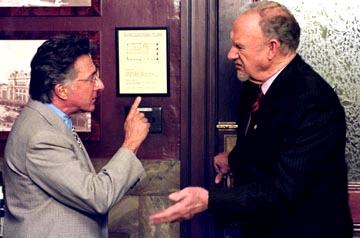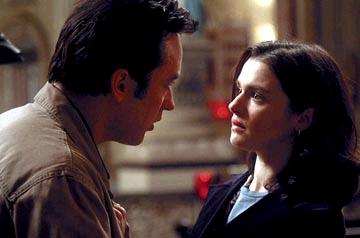

As authors, John Grisham and Michael Crichton have several things in common. Both may not write very well in a literary sense, but do write books that are remarkably easy to read (i.e. quick to go through). Both write fairly technical books (Grisham delves in law while Crichton usually focuses on science) and craft some preposterous stories that, while inherently ridiculous, are enjoyable to read. Both are rich millions of times over, and both write books that translate well into film. As a film, Runaway Jury embodies the best of Grisham the novelist; it is enjoyable and complex, yet preposterous. This is probably one of the better adaptations of Grisham, with a stellar cast that helps the material seem a little more serious than it actually is.
On the way from book to screenplay, Runaway Jury changed from a trial about tobacco to a trial about guns, and the venue moved to New Orleans, which gives the film a little more flavor. The script was tag-team written by Brian Koppelman and David Levien (Knockaround Guys, Rounders), Rick Cleveland (Topa Topa Bluffs, Jerry and Tom) and Matthew Chapman (What's the Worst That Could Happen?, Color of Night) but still feels cohesive. What makes it more gripping than the typical courtroom drama is that there are three parties plotting against each other instead of two. Representing the gun companies are Durwood Cable (Bruce Davison, X2: X-Men United, High Crimes) and ruthless jury consultant Rankin Fitch (Gene Hackman, Behind Enemy Lines, The Royal Tenenbaums), who even has a name that sounds evil. It is Fitch's job to pick and secure a jury that will exonerate the gun company from any culpability stemming from an office shootout that happens in a prologue. To do this, Fitch will surveil any and all potential jurors, discover their deep dark secrets, and then use them against the jurors themselves.
Representing the prosecution is Wendell Rohr (Dustin Hoffman, Confidence, Moonlight Mile) and his jury consultant Lawrence Green, Old School, Black Hawk Down). Rohr believes in the sanctity of the law, and has a much more ethical view of all the proceedings. The wildcard is Nicholas Easter (John Cusack, Identity, Max), who works his way into the jury and then begins manipulating everybody to his own ends. He is working with Marlee (Rachel Weisz Confidence, The Shape of Things) to secure a verdict in their favor. Their favor depends on which side is willing to pay them. Fitch views her as a small nuisance, and Rohr refuses even to entertain the notion of buying a verdict.
Runaway Jury is ably, if not blandly directed by Gary Fleder (Impostor, Don't Say A Word). The only thing that stands out is the acting. With principals like Hackman and Hoffman (who have a brief but electric confrontation), it doesn't take much to get some good acting. Cusack is also good in a role that is a lot more ambiguous than some of his usual choices. There is a lot of tension inherent in the story, and everybody is playing mind games with everybody else, so it is exciting to watch, yet the fact that its roots do not quite lie in reality detract and distract the audience. The things that happen in Runaway Jury will never happen in the real world, and this is what is both good and bad about the film. It's a different kind of popcorn movie; one where people use bigger words yet it's still easy to understand.